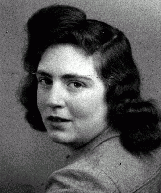You searched for: 澳门威尼斯人网址【手动输入∶___bet126.net___】最新地址请收藏,澳门威尼斯人网址是多少,澳门威尼斯人全部网址,澳门新威尼斯人的网址,澳门威尼斯人网址玩法,澳门威尼斯人网址44,澳门威尼斯人开户网址。
<< Previous | Displaying results 176-200 of 430 for "澳门威尼斯人网址【手动输入∶___bet126.net___】最新地址请收藏,澳门威尼斯人网址是多少,澳门威尼斯人全部网址,澳门新威尼斯人的网址,澳门威尼斯人网址玩法,澳门威尼斯人网址44,澳门威尼斯人开户网址。" | Next >>
-
Henryk Lubelski
ID CardHenryk was raised in a religious Jewish family. His father was a cantor, and his parents placed an emphasis on education. In 1916 the Lubelskis moved to Rawicz, a town in German-occupied Poland. Henryk was first in his class in secondary school, where he also excelled in wrestling and soccer. After graduating, Henryk became an apprentice in a business. 1933-39: In 1935 Henryk's father secured a good position in the city of Katowice. There, Henryk worked in the sausage business. Since Katowice was close to…
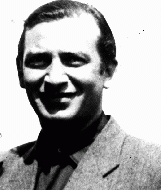
-
Selma Wijnberg
ID CardSelma was the youngest of the Wijnberg's four children, and the only daughter. When she was 7, her family left Groningen to start a business in the town of Zwolle [in the Netherlands]. There her parents ran a small hotel popular with Jewish businessmen traveling in the area. Every Friday there was a cattle market, and many of the cattle dealers came to the Wijnberg's hotel for coffee and business. 1933-39: At home Selma and her family were observant of Jewish tradition because her mother was religious.…
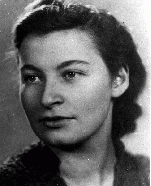
-
Walter Schnell
ID CardWalter was born to a Jewish family in the German town of Strehlen, 25 miles south of Breslau. His family's crystal business was prominent in the town for more than 100 years. Walter's parents sent him to Berlin in the mid-1920s to learn the porcelain trade. He returned to Strehlen in 1926 to help his family run the business. 1933-39: In 1937 Walter's family moved to Breslau. After the German pogroms of 1938 [Kristallnacht, Night of Broken Glass], he was deported to Buchenwald. When he arrived he was…
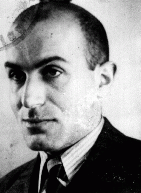
-
Moishe Menyuk
ID CardMoishe was born to a Jewish family in the village of Komarovo, which until 1918 was part of the Russian Empire. At 18, he was drafted into the Russian army and fought in World War I. He was captured by the Germans, and while a POW, learned German. After the war he returned to Komarovo, which by then was part of Poland. He supported his family by farming and managing an estate for a Pole from Warsaw. 1933-39: The few Jews of Komarovo got along well with the Ukrainians. Moishe even played the fiddle at…
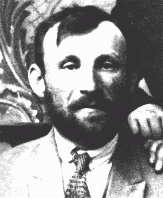
-
Erich Schon
ID CardErich was one of five children born to observant Jewish parents. They lived in Vsetin, a town in Czechoslovakia's Moravia region that straddled the border with Slovakia. Some 70 Jewish families lived in the town of 12,500 persons. There, Erich's family owned a grocery store and operated a sawmill. Erich attended a trade school where he became an expert in lumber and forestry. 1933-39: The Germans kept Erich's family's sawmill operating after they occupied their region in March 1939. Since Erich had a…
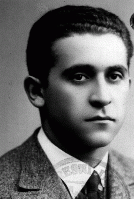
-
Elias (Elya) Grosmann
ID CardElias was born in a small town in the hill country of northeastern Slovakia. His family was Jewish, and he grew up in a religious home in which both Yiddish and Hungarian were spoken. His father was a peddler and his mother ran a small general store. Besides attending public schools, Elias received a formal Jewish education and attended Medzilaborce's rabbinical academy. 1933-39: The townspeople were mostly Jewish and worried about Nazi Germany. The German annexation of Austria in March 1938 alarmed them.…
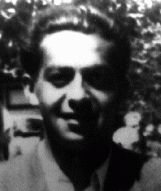
-
Miso Vogel
ID CardMiso came from a religious family in a small village in Slovakia, where his father was a cattle dealer. He was the eldest of five children. When Miso was 6 his family moved to Topol'cany, where the children could attend a Jewish school. Antisemitism was prevalent in Topol'cany. When Miso played soccer, it was always the Catholics versus the Jews. 1933-39: In 1936 Miso had his bar mitzvah and was considered a man. His grandparents traveled 50 miles for it; he was so happy they were all together. In March…
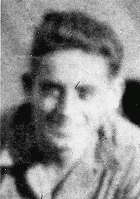
-
Ruth Freund Reiser
ID CardRuth was a child of middle-class Jewish parents living in Czechoslovakia's capital, Prague, where her father worked as a bank clerk. As native Czechs, her parents considered themselves as much Czech as Jewish. In 1933 Ruth was in her second year at a public girls' secondary school. 1933-39: The Germans occupied Prague in March 1939 and imposed many restrictions. Jews were no longer allowed to attend school, so Ruth's education stopped at age 13. Jews had to surrender many of their possessions such as…
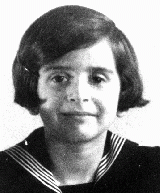
-
David Bergman
ID CardDavid was born to religious Jewish parents in a small town in Ruthenia, Czechoslovakia's easternmost province, which had been ruled by Hungary until 1918. Located in the Carpathian Mountains, the town was so isolated that news from the rest of the country would arrive by a drummer who would read the news in the town's central square. David's father worked as a tailor and his mother was a seamstress. 1933-39: While David's parents worked, he would be at home having a good time. They had a beautiful home…
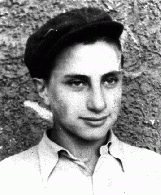
-
Zdenka Popper
ID CardZdenka was one of four children born to a Jewish family in Kolinec, a southwestern Bohemian town near the German border. Her father was a farmer and a lumber and grain merchant. Situated in the foothills of the Bohemian Forest, Kolinec was surrounded by rolling hills. Zdenka attended business school in the nearby town of Klatovy and, in 1927, moved to Prague with her uncle. 1933-39: Zdenka remembers how worried her mother was about the rise of German antisemitism in 1932. After listening to a radio…
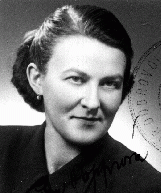
-
Freya Karoline Lang
ID CardAn only child, Freya was born to Jewish parents who lived in a small German town in the Rhine River valley. The Langs owned a successful dry goods business. At this time ready-made clothes were still rare in the countryside. Townspeople and local farmers would purchase fabric at the Lang's store and then take it to their tailor or seamstress to be sewn into a garment. 1933-39: When Freya was growing up, the Nazi party was in power. Many Jews left Germany--Grandmother Lang and one of Freya's uncles sailed…
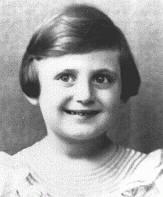
-
Zofia Rapaport
ID CardZofia was born to a Jewish family in Warsaw. Zofia's father, a self-made man who had put himself through university, was a successful banker. The Rapaports lived on a street of single-family homes with gardens. Zofia's room was decorated with yellow lacquered furniture. 1933-39: As a young child, Zofia loved to play with her dog, Chapek. Sometimes she got to go shopping with her mother downtown. Each year during the Jewish holiday of Passover her family visited Zofia's grandparents in Lvov. In late August…
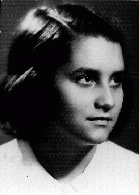
-
Helene Herta Katz Wohlfarth
ID CardHelene, called Herta, was born to a Russian-Jewish father and a German-Jewish mother in a town on the Main River, near Frankfurt. Her father had immigrated to Germany from Russia in 1890. Her mother had automatically taken on her husband's Russian citizenship when she married. In 1914 Russia and Germany went to war, and Russians living in Germany were considered "enemy aliens." 1933-39: Herta married Siegfried Wohlfarth in 1933 and could change from being "stateless" to taking on his German citizenship.…
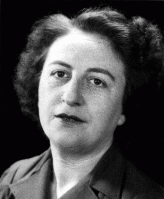
-
Chava Cherniak Biber
ID CardChava's mother died when she was 2, and Chava went to live with her grandfather, who was a rabbi in the village of Matsiov. Her grandfather's second wife welcomed Chava. After first studying at a Polish public school, Chava attended a Jewish day school. When Chava was a teenager her adopted grandmother died, and Chava took over managing her grandfather's household until he remarried. 1933-39: Chava's grandfather's third wife was an unsympathetic woman. After she came to their home, Chava wanted to be…
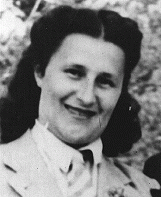
-
Dora Eiger
ID CardDora grew up in the industrial city of Radom, known for its armaments industry. Though fervently Jewish, her Yiddish-speaking parents differed from each other in that her mother was deeply religious while her father was not religious and was an ardent member of the Zionist Labor Party. Also known by her Jewish name D'vora, Dora attended Jewish schools and joined a Zionist youth organization. 1933-39: When Dora visited her uncle near the German border in 1936, she first noticed anti-Jewish placards and…
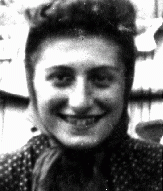
-
Paula Garfinkel
ID CardPaula was one of four children born to a religious Jewish family in Lodz, an industrial city with a large Jewish population. As a child, Paula attended public schools and was tutored at home in Jewish studies three times a week. Her father owned a furniture store. 1933-39: Paula, her brothers, and sisters spent a lot of time at the clubhouse of their Zionist group, Gordonia. Their group believed in humanistic values, Jewish self-labor, and in building a Jewish homeland in Palestine. Paula liked to work…
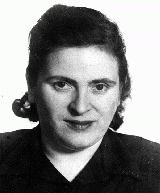
-
Feiga Kisielnicki
ID CardFeiga lived with her husband, Welwel, and their three children in the small, predominantly Jewish town of Kaluszyn, which was 35 miles east of Warsaw. The Kisielnickis were religious and spoke Yiddish in their home. Feiga was a housewife and her husband was a merchant who often traveled, by horse and wagon, to Warsaw on business. 1933-39: Germany recently invaded Poland, and several days ago, German forces fought Polish troops in a battle right here in Kaluszyn. Half the town, including Feiga's house, has…
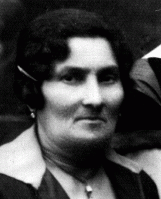
-
David J. Selznik
ID CardThe village in Lithuania where David grew up was located near the Latvian border. His father was a peddler. At age 6, David was sent to Ukmerge, a town known to Jews by its Russian name, Vilkomir, to study traditional Jewish texts at the rabbinical academy there. Six years later, David was called to return home to head the Selznik family because his father had died. 1933-39: David lost his job in 1933, so he left Lithuania and went to the United States and then Portugal. But in 1936 the Baltic states were…
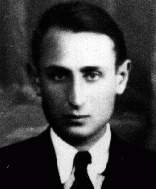
-
Nanny Gottschalk Lewin
ID CardNanny was the oldest of four children born to Jewish parents in the small town of Schlawe in northern Germany, where her father owned the town's grain mill. Nanny was given the Hebrew name Nocha. She grew up on the mill grounds in a house surrounded by orchards and a big garden. In 1911 Nanny married Arthur Lewin. Together, they raised two children, Ludwig and Ursula. 1933-39: Nanny and her widowed mother have moved to Berlin. They feared the rising antisemitism in Schlawe and hoped, as Jews, to be less…
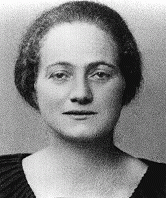
-
Ethel Stern
ID CardEthel was born to a Jewish family living in Warsaw. When she was 9, her family moved to the town of Mogielnica, about 40 miles southwest of Warsaw. Ethel's father spent much of his time studying religious texts. His wife managed the family liquor store. Ethel attended public school during the day and was tutored in religious studies in the evening. 1933-39: Ethel had always wanted to be a teacher. At age 14, after attending religious school in Lodz, she began to teach in the town of Kalisz, where her…
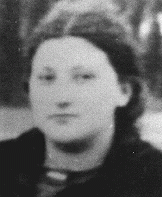
-
Abraham Lewent
ID CardAbraham was born to a Jewish family in the Polish capital of Warsaw. His grandfather owned a clothing factory and retail store, which his father managed. Abraham's family lived in a Jewish section of Warsaw and he attended a Jewish school. Warsaw's Jewish community was the largest in Europe, and made up nearly one-third of the population of the city. 1933-39: After the bombardment of Warsaw began on September 8, 1939, Abraham's family had little to eat. The stores had been reduced to rubble; they had no…
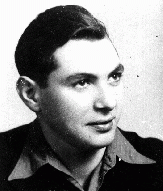
-
Yosel Coller
ID CardOne of six children, Yosel was raised in a religious Jewish family in Lodz, an industrial city in western Poland. His father was a businessman. At the age of 6, Yosel began attending a Jewish day school. His two older sisters attended public school in the morning and religious school in the afternoon. Yosel spent much of his free time playing soccer with his brothers. 1933-39: Yosel's family lived in a modest house in the northern section of Lodz. He went to a Jewish day school and had many friends there.…
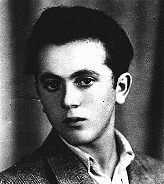
-
Benjamin Bornstein
ID CardBenjamin and his younger brother Zigmush were born to Jewish parents in the industrial city of Lodz. Lodz was Poland's second biggest city before the war, and one-third of its inhabitants were Jewish. Benjamin's father, Moshe, owned a candle factory, and his mother, Brona, was a nurse. 1933-39: In 1939, as Benjamin began the third grade, the Germans occupied Lodz. Jews were forbidden to ride buses, and were ordered to wear yellow stars. Because the Germans sometimes grabbed Jews off the streets for forced…
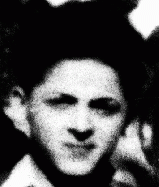
-
Yakob Braun
ID CardYakob's town of Wloclawek was located on the Vistula River. He and his brother Abraham studied Hebrew and German in addition to Polish. Yakob met his bride Machla through a Jewish matchmaker, and after marrying they lived in Lodz. Yakob ran the family textile business until 1938, when he invested in real estate. He became landlord of an apartment building, where he and his family also lived. 1933-39: When the Nazis expelled the Polish Jews from Germany in 1938, Yakob established a relief organization in…
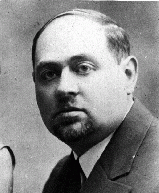
-
Gerda Blachmann
ID CardGerda was an only child of Jewish parents. They lived in Breslau, a large industrial city on the Oder River. Before World War II, Breslau's Jewish community was the third largest in Germany. Her father worked as a salesman for a large hardware and building materials company. Gerda attended public school until age 9 when she was admitted to a Catholic girls' school. 1933-39: Gerda walked through the city to see the aftermath of a pogrom. The windows of Jewish shops had been shattered. A torched synagogue…
